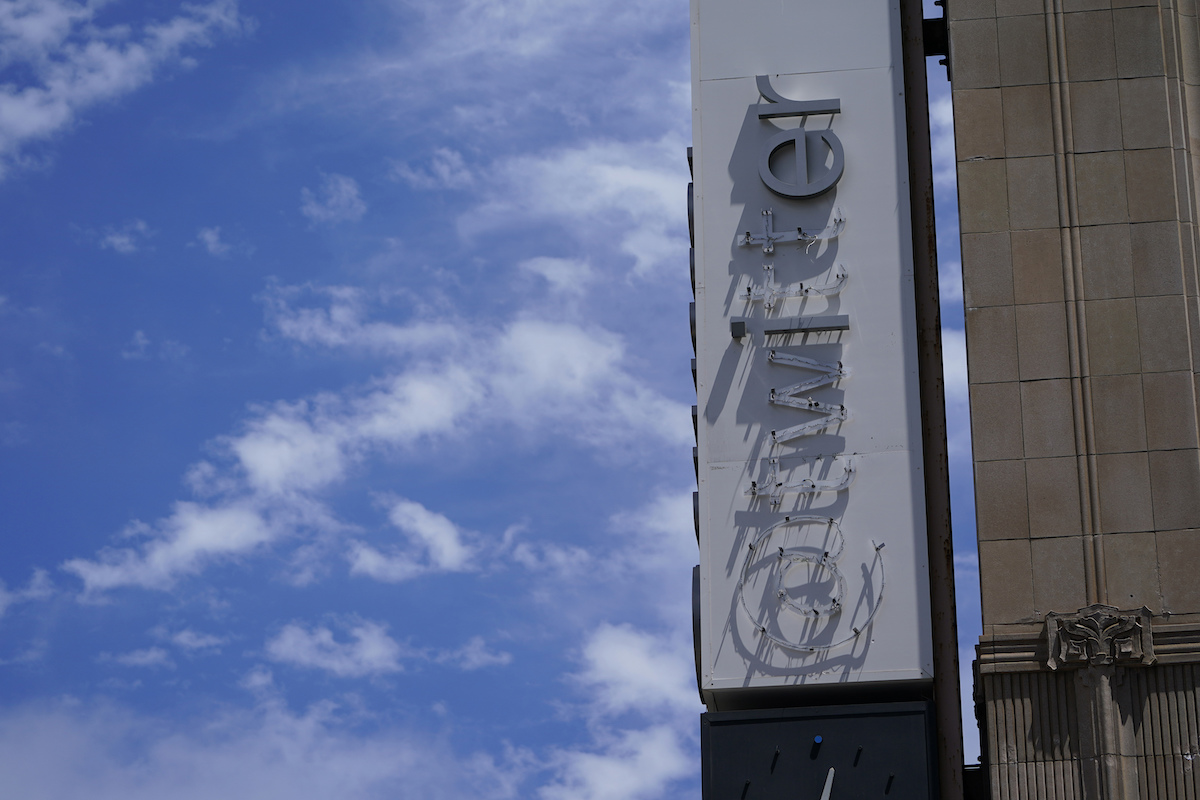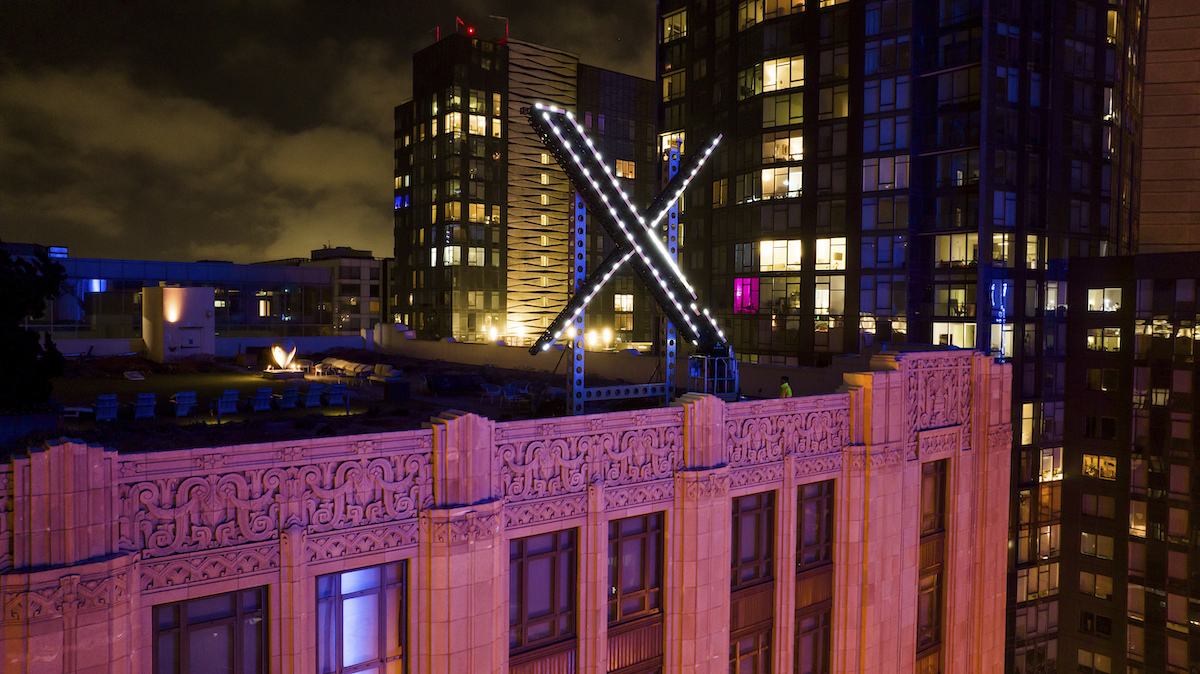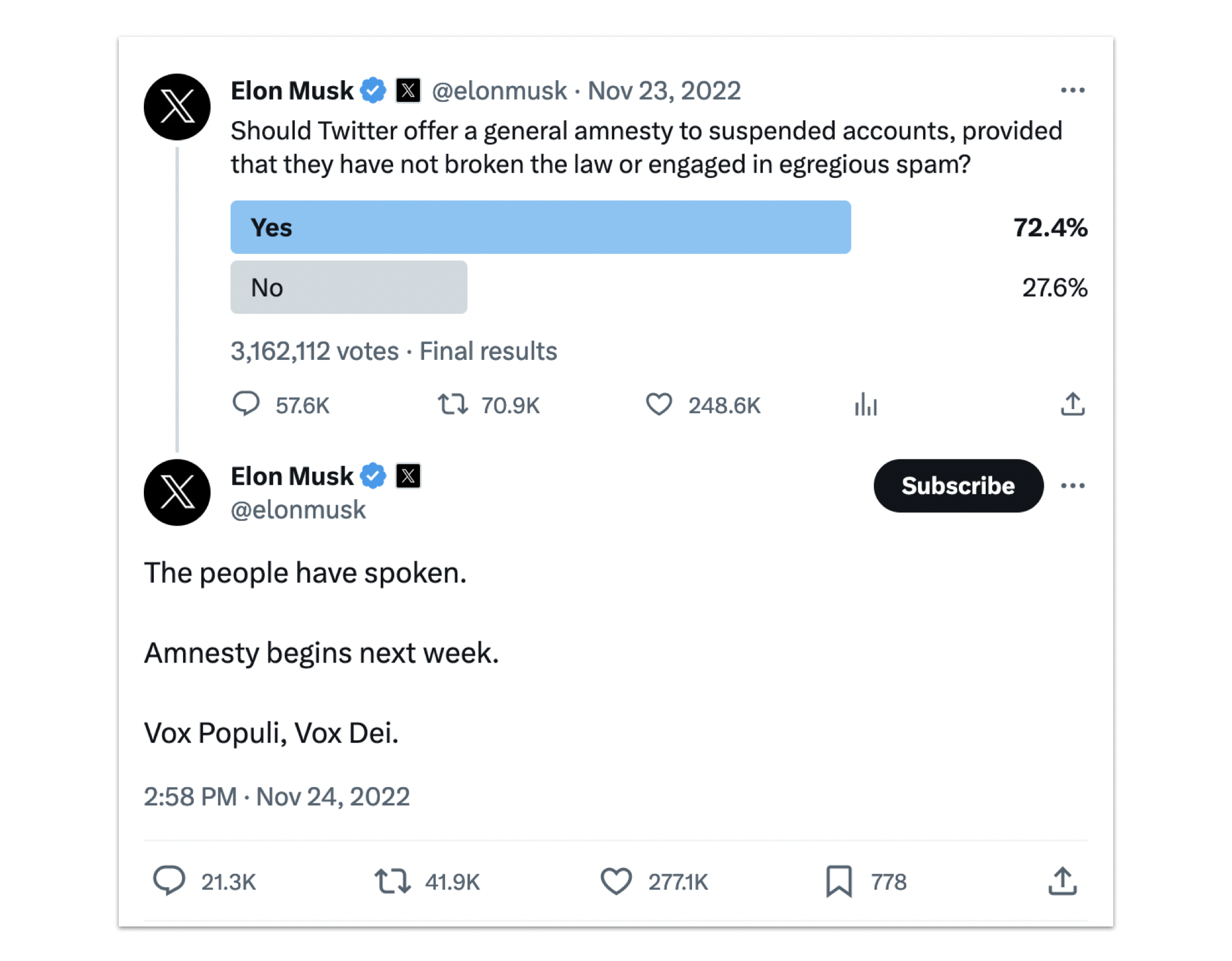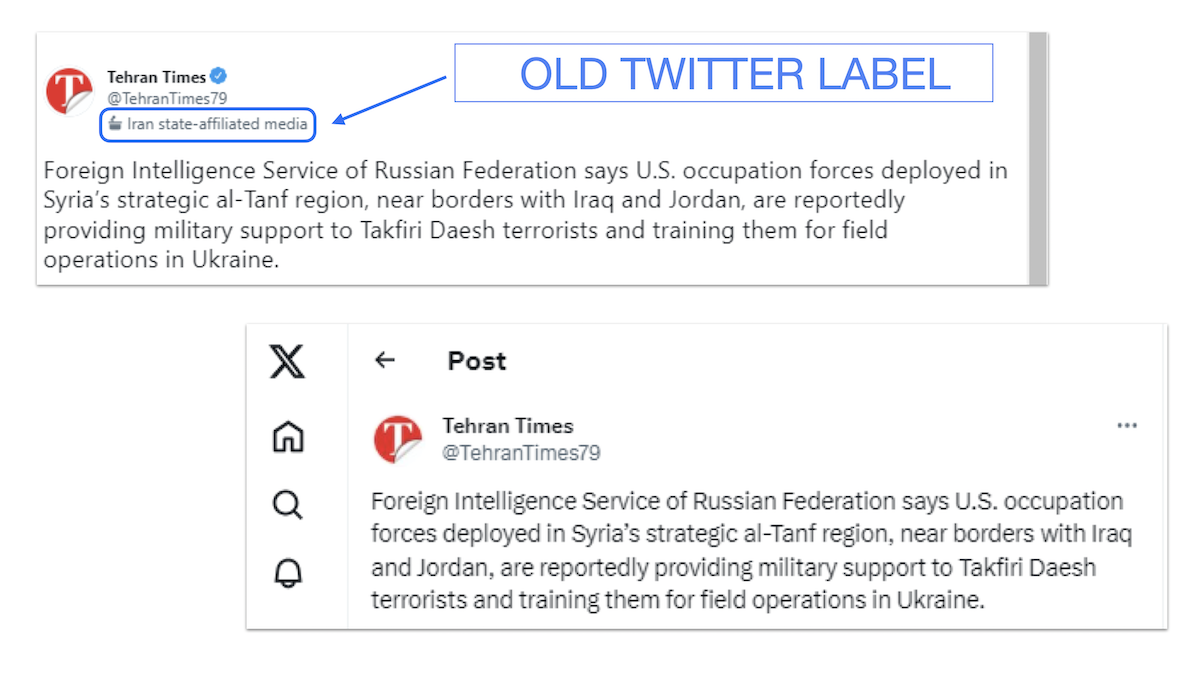Stand up for the facts!
Our only agenda is to publish the truth so you can be an informed participant in democracy.
We need your help.
I would like to contribute

Elon Musk attends the opening of a Tesla factory in Gruenheide, Germany, March 22, 2022. Musk bought X, formerly Twitter, in October 2022. (AP)
If Your Time is short
-
In the year since Elon Musk purchased Twitter for $44 billion, the platform now known as X has removed guardrails designed to restrict the flow of mis- and disinformation, including stripping away what was once a free account verification process designed to combat impersonation and replacing it with paid “blue check” accounts that guarantee posts will be prioritized by X’s algorithm.
-
The platform has instituted processes that experts say elevate and encourage the spread of misleading content, including sharing ad revenue with its largest content creators — accounts that have paid money for “blue checks” to expand their posts’ reach.
-
Data shows that these measures and others have sparked increased sharing of misinformation and hate speech. At the same time, X has instituted cost-prohibitive monthly fees for limited access to Twitter’s application programming interface, or API — data that third-party researchers commonly use to study and measure critical trends about the influence of social media.
Hours after federal filings showed entrepreneur Elon Musk offered about $43 billion to buy Twitter, Musk told a Vancouver TED Talk audience about his vision for the social media platform.
"My strong intuitive sense is that having a public platform that is maximally trusted and broadly inclusive is extremely important to the future of civilization," Musk said April 14, 2022.
Musk closed the Twitter deal Oct. 27, 2022, for $44 billion. A year into Musk’s ownership, however, experts say the platform formerly known as Twitter has, through its practices, eroded trust and fanned misinformation. It disabled features that helped users avoid being duped by false information and established new systems that promote confusion and encourage the spread of false claims.
Musk personally has sown misinformation, too. The day after Hamas militants invaded Israel Oct. 7, killing more than a thousand people, Musk directed his millions of followers to two accounts that he described as "good" sources for "real-time" information about the war — both known for publishing unverified stories and false accounts. Musk later took down the tweet, but it had been seen 11 million times. Three days later, he posted a laughing emoji on a post that falsely suggested CNN had faked an attack in Israel.
That the anniversary of Musk’s acquisition coincides with the outbreak of the Israel-Hamas war provides a real-time snapshot of the platform’s health. Pre-Musk Twitter was hardly a panacea in the world of truth-trading. And the flood of Israel-Hamas war misinformation on X — the new name Musk gave Twitter in late July — isn’t unique to this violence or unprecedented on social media.
But taken together, experts told PolitiFact that the changes Musk has ushered in — sometimes erratically and based on the outcomes of user polls — have worsened the information ecosystem on a platform once revered as a go-to place for breaking news.
"Under Elon Musk's ownership, misinformers are emboldened and lent an air of legitimacy," said Jack Brewster, enterprise editor with NewsGuard, a company that tracks online misinformation. "Rather than achieving the goal of leveling the playing field, Musk’s alterations, which include a major overhaul of the platform’s verification system and a reduction in content moderation, have instead fostered an environment in which bad actors can flourish."
When PolitiFact contacted X for comment about this story, we received an auto-reply that said, "Busy now, please check back later."

A sign with removed characters is seen July 24, 2023, on the Twitter headquarters building in San Francisco. (AP)
Research shows rising misinformation, hate speech on X, even with limited data
Analysts have documented some notable shifts on the platform since Musk took over:
-
The Atlantic Council’s Digital Forensic Research Lab found in October that a network of pro-Saudi Arabia Twitter accounts were coordinating in an apparent attempt to persuade Musk to reinstate the account of a banned user who, according to reports, helped orchestrate the 2018 murder of Jamal Khashoggi, a Saudi journalist and Washington Post columnist who was critical of Saudi Arabia’s crown prince.
-
The numbers of tweets containing slurs have spiked, as has the volume of engagement with those tweets, the Center for Countering Digital Hate reported in December 2022. The Center analyzed the number of tweets containing certain slurs on an average day in 2022 — from Jan. 1 to Oct. 27, 2022 — and compared it with the average number of daily tweets containing those slurs from Musk’s Oct. 28 takeover to Nov. 29, 2022. The Center found that depending on the word, the average number of daily posts using slurs shot up between 33% to 202%. Musk has since sued the group, accusing it of a "scare campaign to drive away advertisers from the X platform." The case is ongoing.
-
Russian, Chinese and Iranian state media outlets known for spreading disinformation gained followers on Twitter, the Digital Forensic Research Lab reported in April. Its analysis relied on data from Meltwater Explore, a social media monitoring platform, to analyze Twitter data from Jan. 1 to April 19 for accounts labeled "state-affiliated." Twitter under Musk took deliberate steps to stop reducing the reach of accounts from such state-sponsored sources, NPR reported.
-
In the 90 days after April 21, when X removed labels identifying content from state-affiliated accounts, Russian, Chinese, and Iranian state media English-language accounts surged 70% compared with the previous 90-day period, NewsGuard found.
But X itself has thwarted researchers’ efforts to analyze critical trends, despite Musk’s stance that its policy is to keep things "open source and transparent." In February, the platform started charging cost-prohibitive fees of $42,000 to $210,000 per month for limited access to Twitter’s application programming interface, or API. The interface gives third-party researchers access to data they can analyze to better understand how information spreads. Researchers have used such data to learn more about social media’s role in election misinformation spread, democracy, COVID-19 discourse and social justice advocacy.
There is also a $100 per month API access option, but researchers say the data it provides is far too limited. The board for the Coalition for Independent Technology Research, a group of academics, journalists, civil society researchers and community scientists interested in advancing research on technology’s impact on society, criticized the changes. It said that prior API availability gave researchers low-cost access to real-time data on 10% of all tweets while even the most expensive tier under Musk’s new plan would cut access by 80% and cost 400 times more.
"Twitter’s new system to monetize and dramatically restrict access to its API will render this research and development impossible," the coalition wrote in an open letter April 3. "Unless they can pay, researchers will not be able to collect any tweets at all."
Mike Caulfield, a research scientist at the University of Washington’s Center for an Informed Public, said, "The tools that researchers would generally use to answer a question like ‘is there more or less misinformation’ have been taken away."
As European Union regulators crack down on social media misinformation and hate speech, Musk has signaled little interest in cooperating. Under his leadership, Twitter withdrew from the EU’s Code of Practice on Disinformation, a unique set of voluntary commitments social media platforms made to research and fight disinformation.
Twitter leaves EU voluntary Code of Practice against disinformation.
— Thierry Breton (@ThierryBreton) May 26, 2023
But obligations remain. You can run but you can’t hide.
Beyond voluntary commitments, fighting disinformation will be legal obligation under #DSA as of August 25.
Our teams will be ready for enforcement.
Before Musk pulled out, however, TrustLab, a company commissioned by the social media platforms in response to that agreement, accessed X’s data on the platforms in three EU countries.
TrustLab’s September report analyzing the prevalence and sources of disinformation on social media found that mis- and disinformation discoverability — a measure of how easily a platform surfaces mis- and disinformation for users searching certain keywords — is highest on X compared with Facebook, TikTok, Instagram, YouTube and LinkedIn. Mis- and disinformation content on X received more engagement than other content, and X had the largest "ratio of disinformation actors," which refers "to the proportion of disinformation actors relative to the total accounts sampled on a platform." The analysis included samples from May to June 2023.
TrustLab co-founder and CEO Tom Siegel said that compared with other platforms, this data snapshot showed misinformation is the worst on Musk’s platform. "Has it always been that way? Has it recently spiked particularly when the governance change started happening?" Siegel said, reflecting on this data set. "I can’t say that with certainty."
Musk has also appeared to resist other efforts in the EU to discourage bad actors from sharing false information.
When EU Commissioner Thierry Breton posted on X an Oct. 10 open letter, calling on Musk to enforce rules of the new Digital Services Act and moderate and remove violent and terrorist content, Musk responded by asking him to list the violations on X so "the public can see them."
Breton was unmoved. "You are well aware of your users’ — and authorities’— reports on fake content and glorification of violence," he responded.
The transformation of the blue check mark: How an $8 subscription fee buys favor with the platform’s algorithm
Twitter’s blue check mark was a once-coveted indicator that an account holder’s identity was authentic, "verified."
On X, paid users reign supreme.
Under Musk’s changes — initially called "Twitter Blue" but now called "X Premium" — anyone can buy a blue check mark for $8 a month or $84 a year, guaranteeing that their posts, no matter the content, will be prioritized by X’s algorithm.
Rampant impersonation followed Twitter Blue’s launch Nov. 9. An account impersonating the pharmaceutical giant Eli Lilly and Co. and carrying a blue check mark falsely tweeted, "We are excited to announce insulin is free now," triggering a drop in Eli Lilly’s stock price.
A day later, Twitter paused the program. When it relaunched in December, it included some safeguards to prevent impersonation. Then, in late March 2023, Musk announced that only subscribers’ tweets would be recommended on the "For You" page — the default feed users see when opening the platform.
The result is that people are exposed to mis- and disinformation shared by accounts they don’t follow and previously might not have seen, said Nick Reiners, senior analyst at Eurasia Group, a political risk consultancy.
These changes were among the most influential to the proliferation of misinformation on X, experts told us.
News organizations, including PolitiFact, were also stripped of the verified blue checks that afforded credibility and warded off impersonators — unless they paid a monthly business subscription fee of $1,000, which would secure them a gold check mark.
So, verifiable news became harder to find as less-trusted sources were empowered to thrive. "The easiest way to get distribution is to buy it," Siegel said. That means people who want to spread scams or low-quality information online have a cheap and convenient way to do so.
McKenzie Sadeghi, a NewsGuard senior analyst, said the change gave misinformers willing to pay "an air of legitimacy."

Workers install lighting on an "X" sign atop the company headquarters, formerly known as Twitter, on July 28, 2023, in San Francisco. (AP)
Viral posts have become profitable
Bad information has click-appeal; it is often designed to trigger an emotional response, said Kolina Koltai, a former Twitter contractor now with Bellingcat, a Netherlands-based digital investigative journalism group.
So, in mid-July, when X began sharing ad revenue with its largest content creators who also pay for blue check marks, it compounded the platform’s misinformation problem, experts said.
Now, blue check mark subscribers can earn a profit when people interact with their content. It is unclear how an account becomes eligible for payouts, or how the payments are calculated.
The first round of payments to creators totaled $5 million, according to Musk. Those payments went largely to right-wing influencers, with people such as Andrew Tate, Ian Miles Cheong and Benny Johnson each tweeting that they’d received payments of about $10,000 or more.
X’s revenue sharing policy introduced "an additional incentive for posting viral low-quality content," said Boston University professor Gianluca Stringhini, who researches malicious activity on the internet.
Researchers have already started to document this incentive’s impact.
From Oct. 7 to Oct. 14, the Israel-Hamas war’s first week, NewsGuard analyzed "the 250 most-engaged posts" that promoted one of 10 prominent false or unsubstantiated war narratives identified by NewsGuard and found that 186 of the posts were shared by X subscribers with blue checks. Such narratives included the false claims that CNN staged an attack in Israel and that a White House memo showed the U.S. approved $8 billion in aid for Israel.
This means 74% "of the most viral posts on X advancing misinformation about the Israel-Hamas War" were pushed by paid X users, NewsGuard found.
While amplifying falsehoods, Musk has replatformed misinformers
Musk himself shares false and misleading narratives and has used his position to promote accounts of known misinformers.
On Oct. 30, 2022, three days after closing his Twitter purchase, Musk tweeted a link from a site known to spread misinformation that fueled an unsubstantiated narrative about the attack on then-House Speaker Nancy Pelosi’s husband, Paul Pelosi. Musk later deleted the tweet.
Musk restored accounts for thousands of users who were once banned from Twitter for misconduct such as posting violent threats, harassment or spreading misinformation.
On Nov. 19, less than a month after taking over the platform, Musk restored former President Donald Trump’s account after holding a poll that asked users whether he should. Trump had been banned since Jan. 6, 2021, when a pro-Trump mob attacked the U.S. Capitol.
On Nov. 23, Musk asked users whether the platform should "offer a general amnesty to suspended accounts, provided that they have not broken the law or engaged in egregious spam." After 72% of respondents voted "yes," Musk said he would implement such a policy.

In November 2022, Elon Musk polled users to help him decide whether to reinstate accounts that had been suspended before he took over the platform. (Screenshot from X)
It appears these reinstated accounts drive profit for X.
The Center for Countering Digital Hate in February analyzed publicly available data on tweet impressions for 10 reinstated accounts it described as "renowned for publishing hateful content and dangerous conspiracies." By its estimates, the platform stood to make more than $19 million per year in ad revenue from the 10 accounts, most of which appeared to have paid for blue check marks.
X’s Help Center says it addresses misinformation. But its policies are not clear.
The Help Center says the actions it takes on misinformation are "meant to be proportionate to the level of potential harm from that situation" and warns that people who repeatedly violate the platform’s policies "may be subject to temporary suspensions."
It also says it limits amplification of misleading content or removes it "if offline consequences could be immediate and severe." But it does not explain what content would qualify.
Before Musk, repeated violations of Twitter’s policies prohibiting the spread of COVID-19 and election misinformation could result in permanent bans, CNN reported.
About a month after Musk’s takeover, the platform said it would no longer enforce its COVID-19 misinformation policy. The platform’s written policy on election misinformation says the platform can label or deamplify posts that confuse users about their ability to vote, including incorrect information about polling times or locations, PolitiFact reported. But PolitiFact has reported that the policy’s enforcement is inconsistent.
Siegel said that judging by the X content that freely spreads unchecked, it appears X has become more permissive about what people can say on the platform before facing penalties. That reflects a shift in values within X’s leadership.
"It’s just really deciding what, as a platform, do you allow and not allow, according to your own values?" Siegel said. "They’re just extremely biased toward freedom of speech and not interfering with people’s rights to post content."
Musk, a self-described "free speech absolutist," has repeatedly said that he promotes free speech to the extent that it is legal.
"I don’t know what’s going on with every part of this platform all the time, but our policy worldwide is to fight for maximum freedom of speech under the law," Musk wrote Sept. 17. "Anyone working for X Corp who does not operate according to this principle will be invited to further their career at any one of the other social media companies who sell their soul for a buck."
At times, however, Musk has flip-flopped on his free speech stance. He said he would not ban an account that was following his plane, and then he did ban it.
Musk’s changes made vetted, independent news harder to find
Gone are many features people once used to more successfully navigate the platform’s information environment.
In April, Musk’s platform removed labels that told users when accounts were state-affiliated or government-funded and stopped reducing their reach. Users no longer know of an account’s government ties, unless they have previous knowledge of that entity or conduct their own research, Sadeghi said.

Screenshots of a May 18, 2022, Tehran Times post show that although Twitter once displayed a "state-affiliated media" label the accounts’ posts, that label no longer appears on X. (Images courtesy of NewsGuard)
As a result of Musk’s 2022 layoffs, experts say the platform has little to no staff dedicated to content moderation or fostering trust and safety.
Reiners said the changes to how accounts obtain check marks undermined news organizations by making it harder to identify authentic news organizations’ accounts.
Russian state-sponsored media organization, RT, for example, now shows the paid gold check mark badge but no longer includes the label alerting readers that it’s state-sponsored. Some local news organizations have check mark accounts; others do not. In the case of The New York Times, it appears X freely gave the gold badge and then took it away.
In a recent update, X also stopped displaying headline text when news outlets share links to stories, making news content harder to recognize — a change Reiners called "baffling."
Musk’s displeasure with the press has seemed apparent in other decisions, too.
On Dec. 15, Musk abruptly banned from Twitter several journalists, including from The Washington Post, The New York Times and CNN, who had reported on a platform rule change that led to the suspension of @ElonJet, an account that tracked the location of Musk’s private jet. Musk claimed without evidence that the journalists had violated an anti-doxxing policy by sharing his precise, real-time location.
Facing backlash, Musk again polled platform users. A majority of voters supported reinstating the journalists, and Musk reinstated most of the accounts by Dec. 18.
In August, The Washington Post reported that X deliberately slowed users’ access to links directing people to news organizations and other social media platforms, including The New York Times, Reuters and Facebook.
Crowd-sourced fact-checking via Community Notes is not enough, experts say
X touted its Community Notes program — the platform’s crowdsourced approach to addressing misinformation — as one way to combat Israel-Hamas war misinformation. The program allows certain users to submit context to tweets that might be otherwise misleading.
"In one week we’ve added 10,000 new authors and simultaneously rolled out new enhancements to help people see more notes, faster," X’s CEO Linda Yaccarino posted Oct. 16.
On Oct. 17, the Community Notes account said it would require people to include sources for proposed notes. Musk responded: "Links to actual source data, not some bs press article, are what matter. Many legacy media organizations have no business model or meaningful circulation anymore — they just exist as propaganda tools for their owners."
Experts described Community Notes as innovative, but they cautioned that the feature is imperfect and not enough to single-handedly combat misinformation on X.
Using "the wisdom of crowds" to inform rather than having platform moderators decide what people can or cannot see is one way to promote freedom of speech while providing context, said Siegel.
For example: In June, Florida Gov. Ron DeSantis falsely claimed that the Los Angeles Dodgers’ decision to recognize an LGBTQ+ group during a Pride Night event resulted in photos of "a virtually empty stadium" for the game, and his post received a Community Note. "The photo was taken an hour before the opening pitch," it read. "The Dodgers reported attendance for June 16 was 49,074."
The downside is that forms can get spammed, and Community Notes can contain inaccurate information or lack crucial context.
Community Notes volunteers have expressed frustration at how long it has taken for notes to appear on posts containing misinformation since the Israel-Hamas war started. Community Notes must be accepted by a consensus of people from across the political spectrum, so they can be slow to publicly appear. And many notes on polarizing subject matters will never become public at all; sometimes, they disappear.
NewsGuard found that Community Notes appeared on 79 of the 250 posts the group analyzed that shared misinformation about the Israel-Hamas war — or 31.6% of the time.
Koltai, who researched Community Notes for Twitter, said the initiative was not meant to be the platform’s only approach to addressing misinformation.
Siegel said, "Anytime you have a free-form feature that allows for community action and interaction, it just has a lot of potential to introduce a lot of noise."
PolitiFact Researcher Caryn Baird contributed to this report.
RELATED: Amid images and news of actual war, false and misleading claims about Israel-Hamas thrive
RELATED: Elon Musk said he wouldn’t ban the Twitter account tracking his jet. Weeks later, he suspended it
Our Sources
Interview with McKenzie Sadeghi, a senior analyst at NewsGuard, Oct. 11, 2023
Interview with Dina Sadek, a Middle East research fellow with the Atlantic Council’s Digital Forensic Research Lab, Oct. 12, 2023
Interview with Tom Siegel, co-founder and CEO of TrustLab, Oct. 13, 2023
Interview with Imran Ahmed, founder and CEO of Center for Countering Digital Hate, Oct. 13, 2023
Interview with Kolina Koltai, a senior researcher and trainer at Bellingcat, Oct. 13, 2023
Email interview with Gianluca Stringhini, a Boston University professor in the Department of Electrical and Computer Engineering, Oct. 13, 2023
Email interview with Nick Reiners, senior analyst in geo-technology practice at Eurasia Group, Oct. 13, 2023
Email interview with Scott Bade, senior analyst in geo-technology practice at Eurasia Group, Oct. 13, 2023
Email interview with Mike Caulfield, a research scientist at the University of Washington’s Center for an Informed Public, Oct. 12, 2023
Email from Center for Countering Digital Hate spokesperson, Oct. 19, 2023
Emailed statement from Jack Brewster, NewsGuard enterprise editor, Oct. 19, 2023
The Washington Post, As false war information spreads on X, Musk promotes unvetted accounts, Oct. 8, 2023
The Washington Post, Misinformation research is buckling under GOP legal attacks, Sept. 23, 2023
The Washington Post, A nonprofit fights GOP allegations that it supported a ‘censorship regime,’ Aug. 17, 2023
The Washington Post, Musk’s new Twitter policies helped spread Russian propaganda, E.U. says, Sept. 1, 2023
PolitiFact, How health incidents like Bronny James’ cardiac arrest fuel COVID-19 vaccine misinformation, July 31, 2023
Poynter.org, A reporter made sure a retired police chief’s death didn’t go uncovered. Then social media attacked her, Sept. 19, 2023
Poynter.org, Why Twitter’s Community Notes feature mostly fails to combat misinformation, June 30, 2023
NewsGuard, X’s Unchecked Propaganda: Engagement Soared by 70% for Russian, Chinese, and Iranian Disinformation Sources Following a Change by Elon Musk, Sept. 26, 2023
The Washington Post, Twitter, now X, sues group that researched hate speech on platform, Aug. 1, 2023
Center for Countering Digital Hate, Toxic Twitter: How Twitter generates millions in ad revenue by bringing back banned accounts, Feb. 9, 2023
Center for Countering Digital Hate, Twitter fails to act on 99% of Twitter Blue accounts tweeting hate, June 1, 2023
The Washington Post, Elon Musk’s X is throttling traffic to websites he dislikes, Aug. 16, 2023
Wired, The Israel-Hamas War Is Drowning X in Disinformation, Oct. 9, 2023
Platformer, How the attacks in Israel are changing Threads, Oct. 9, 2023
France24, Tech firms struggle as Israel-Gaza falsehoods explode, Oct. 10, 2023
The Information, Elon Musk’s X Cut Disinformation-Fighting Tool Ahead of Israel-Hamas Conflict, Oct. 9, 2023f
The Washington Post, As false war information spreads on X, Musk promotes unvetted accounts, Oct. 8, 2023
Reuters, Musk's X disabled feature for reporting electoral misinformation - researcher, Sept. 26, 2023
Foreign Policy, Elon Musk’s Twitter Is Becoming a Sewer of Disinformation, July 15, 2023
Institute for Strategic Dialogue, Deny, Deceive, Delay: Exposing New Trends in Climate Mis- and Disinformation At COP27, accessed Oct. 10, 2023
BBC, X scraps tool to report electoral fake news - researchers, Sept. 28, 2023
BBC, Disinformation most active on X, formerly known as Twitter, EU says, Sept. 26, 2023
TrustLab, Code of Practice on Disinformation: A Comparative Analysis of the Prevalence and Sources of Disinformation across Major Social Media Platforms in Poland, Slovakia, and Spain, September 2023
WPTV, X has more fake news than other social media platforms, EU reports, Sept. 28, 2023
Tech Explore, Tech firms struggle as Israel-Gaza falsehoods explode, Oct. 10, 2023
University of Florida College of Journalism and Communications, Twitter Users Engage More with Factual Discourse than Misinformation, Oct. 5, 2023
Springer Link, People Still Care About Facts: Twitter Users Engage More with Factual Discourse than Misinformation, Aug. 3, 2023
NewsGuard, Verified Misinformation: ‘Blue Check’ Twitter Accounts are Flooding the Platform with False Claims, April 2023
The Washington Post, Elon Musk wants a free speech utopia. Technologists clap back, April 18, 2022
The Washington Post, ‘Opening the gates of hell’: Musk says he will revive banned accounts, Nov. 24, 2022
CBS News, Twitter starts removing blue check marks from users who don't pay, April 20, 2023
The Washington Post, Elon Musk’s first big Twitter product paused after fake accounts spread, Nov. 11, 2022
NPR, NPR quits Twitter after being falsely labeled as 'state-affiliated media,' April 12, 2023
European Commission, Digital Services Act: Application of the Risk Management Framework to Russian disinformation Campaigns, Aug. 24, 2023
The Washington Post, Twitter removes labels from state-controlled media, helping propaganda, April 21, 2023
Demand Sage, Twitter Statistics In 2023 — (Facts After "X" Rebranding), Sept. 16, 2023
Reuters, Australia's Indigenous Voice referendum faces misinformation linked to COVID influencers, Sept. 7, 2023
Insider, Elon Musk says his politics are in the center but extremism experts say he's using Twitter to increasingly empower right-wing viewpoints, Dec. 11, 2022
The New York Times, In Latest Round of Job Cuts, Twitter Is Said to Lay Off at Least 200 Employees, Feb. 26, 2023
The Associated Press, Twitter rolls back COVID misinformation policy, Nov. 29, 2022
The Washington Post, Twitter and Facebook warning labels aren’t enough to save democracy, Nov. 9, 2020
Nieman Reports, Six Months Ago NPR Left Twitter. The Effects Have Been Negligible, Oct. 11, 2023
ABC News, Elon Musk announces 'temporary limits' for reading Twitter posts, July 1, 2023
X Help Center, X Premium, accessed Oct. 13, 2023
Platformer, Why some tech CEOs are rooting for Musk, Nov. 28, 2022
CNN, Elon Musk says he’s cut about 80% of Twitter’s staff, April 12, 2023
NPR, Musk's Twitter has dissolved its Trust and Safety Council, Dec. 12, 2022
USA Today, Twitter layoffs slash content moderation staff as new CEO Elon Musk looks to outsource, Nov. 15, 2022
Mashable, Elon Musk just shut down automation for important public safety accounts, April 15, 2023
CNN, Why Twitter users are upset about the platform’s latest change, Feb. 3, 2023
KTVU, Elon Musk takes over Twitter, saying it will be "digital town square" not a "free-for-all," Oct. 27, 2022
The New York Times, Twitter’s New Chief Eases Into the Hot Seat, June 29, 2023
CNN, Elon Musk is no longer the CEO of Twitter. Linda Yaccarino officially starts in role, June 6, 2023
The New York Times, Elon Musk, in a Tweet, Shares Link From Site Known to Publish False News, Oct. 30, 2022
Montclair State University, Hate Speech Spikes on Twitter After Elon Musk Acquires the Platform, Nov. 1, 2022
NPR, Twitter begins advertising a paid verification plan for $8 per month, Nov. 6, 2022
The New York Times, Twitter Is Said to Delay Changes to Check Mark Badges Until After Midterms, Nov. 6, 2022
The Washington Post, A fake tweet sparked panic at Eli Lilly and may have cost Twitter millions, Nov. 14, 2022
The Washington Post, Elon Musk begins mass layoffs at Twitter, Nov. 4, 2022
Fierce Pharma, Eli Lilly pulls Twitter ads after blue check fallout: report, Nov. 15, 2022
The Guardian, Twitter to promote only paying users’ tweets, Elon Musk announces, March 28, 2023
Salon, Twitter's new revenue-sharing program benefits blue check trolls, July 15, 2023
Vox, Elon Musk is just throwing money at popular Twitter users now, July 14, 2023
Developers post on Twitter, Feb. 2, 2023
Post on Twitter, July 13, 2023
CNN, Elon Musk: Only paid subscribers will get recommended in Twitter ‘For You’ feed, March 28, 2023
Elon Musk post on Twitter, March 27, 2023
MIT News, Study: On Twitter, false news travels faster than true stories, March 8, 2018
Science, The spread of true and false news online, March 9, 2018
The Associated Press, Musk restores Trump’s Twitter account after online poll, Nov. 19, 2022
Elon Musk post on Twitter, Nov. 24, 2023
Brookings, Why is Elon Musk’s Twitter takeover increasing hate speech? Nov. 23, 2022
Yoel Roth thread on Twitter, Oct. 29, 2022
Network Contagion Research Institute post on Twitter, Oct. 28, 2022
Center for Countering Digital Hate, The Musk Bump: Quantifying the rise in hate speech under Elon Musk, Dec. 6, 2022
CNN, Elon Musk’s Twitter lays off employees across the company, Nov. 9, 2022
CNN, Elon Musk bans several prominent journalists from Twitter, calling into question his commitment to free speech, Dec. 16, 2023
Post on X, Oct. 7, 2023
NBC, Inside X’s Community Notes, fact-checks on known misinformation are delayed for days, Oct. 10, 2023
Elon Musk post on X, Oct. 11, 2023
Vanity Fair, Elon Musk Isn’t Just Enabling Misinformation About the Israel-Hamas War—He’s Fueling It Himself, Oct. 12, 2023
The Washington Post, Musk’s ‘free speech’ agenda dismantles safety work at Twitter, insiders say, Nov. 22, 2023
The Washington Post, Twitter algorithms amplify conservative content more than that of the political left, researchers find, Oct. 22, 2021
Quartz, A detailed timeline of Elon Musk buying Twitter, May 20, 2022
Elon Musk post on Twitter, April 25, 2022
Elon Musk post on Twitter, Oct. 27, 2022
PolitiFact, Elon Musk said he wouldn’t ban the Twitter account tracking his jet. Weeks later, he suspended it, Dec. 19, 2022
PolitiFact, No, CNN didn’t stage an attack near the Israel-Gaza border, Oct. 12, 2023
PolitiFact, Memo showing White House approved $8 billion to Israel is altered, Oct. 11, 2023
PNAS, Sharing of misinformation is habitual, not just lazy or biased, Jan. 17, 2023
The Associated Press, X promises ‘highest level’ response on posts about Israel-Hamas war. Misinformation still flourishes, Oct. 10, 2023
NBC News, Kanye West returns to Twitter with 'shalom' post after ban over antisemitic remarks, Nov. 21, 2022
University of Michigan, Iffy Quotient, accessed Oct. 16, 2023
NBC News, Trump's blog isn't lighting up the internet, May 11, 2021
X Help Center, How we address misinformation on X, accessed Oct. 17, 2023
BuzzFeed News, Elon Musk Said He Wants To Buy Twitter For The ‘Future Of Civilization,’ April 14, 2022
YouTube, Elon Musk talks Twitter, Tesla and how his brain works — live at TED2022, April 14, 2022
Wired, Twitter’s $42,000-per-Month API Prices Out Nearly Everyone, March 18, 2023
NPR, EU law targets Big Tech over hate speech, disinformation, April 23, 2022
CNN, EU unveils new ‘anti-disinformation code’ to crack down on fake accounts and falsehoods, June 16, 2022
Thierry Breton post on Twitter, May 26, 2023
European Commission, The 2022 Code of Practice on Disinformation, accessed Oct. 17, 2023
TrustLab, Code of Practice on Disinformation, September 2023
The Guardian, Saud al-Qahtani: who is fixer cleared by Saudis over Khashoggi murder? Dec. 23, 2019
DFRLab, Suspicious Twitter accounts promote Saudi Arabia, call for reinstating Saud Al-Qahtani, Oct. 4, 2023
NPR, Twitter once muzzled Russian and Chinese state propaganda. That's over now, April 21, 2023
Elon Musk post on X, Oct. 18, 2023
Community Notes post on X, Oct. 17, 2023
Ron DeSantis post on Twitter, June 17, 2023
X Safety post on X, Oct. 9, 2023
Coalition for Independent Technology Research, Letter: Twitter’s New API Plans Will Devastate Public Interest Research, April 3, 2023
Vox, Elon Musk’s Israel disinformation investigation, explained, Oct. 17, 2023
BBC, EU safety laws start to bite for TikTok, Instagram and others, Aug. 25, 2023
Thierry Breton post on X, Oct. 10, 2023
Elon Musk post on X, Oct. 10, 2023
Thierry Breton post on X, Oct. 10, 2023
The Washington Post, What the E.U.’s sweeping rules for Big Tech mean for your life online, Aug. 30, 2023
ACM Digital Library, The Impact of Twitter Labels on Misinformation Spread and User Engagement: Lessons from Trump's Election Tweets, April 2022
Science Direct, Patterns of democracy? Social network analysis of parliamentary Twitter networks in 12 countries, July 2021
JMIR Publications, Tracking Social Media Discourse About the COVID-19 Pandemic: Development of a Public Coronavirus Twitter Data Set, April 10, 2020
MIT Press, #HashtagActivism, accessed Oct. 18, 2023
Elon Musk post on X, April 20, 2023
The Verge, LeBron James didn’t pay for his Twitter checkmark, but Elon Musk gave it to him anyway, April 20, 2023
Elon Musk post on Twitter, June 9, 2023
The Washington Post, Far-right Twitter influencers first on Elon Musk’s monetization scheme, July 14, 2023
Elon Musk post on Twitter, July 14, 2023
Yahoo Finance, Twitter's new revenue-sharing program benefits blue check trolls, July 15, 2023
Social Media Today, Twitter’s Engagement Thresholds for Its Creator Ad Revenue Share Program Will Be Hard for Most to Reach, July 12, 2023
Huffpost, Twitter’s Monetization For Blue-Check Accounts May Be Fueling Fake News On Israel-Palestine, Oct. 10, 2023
NPR, Twitter will no longer enforce its COVID misinformation policy, Nov. 29, 2022
CNN, For misinformation peddlers on social media, it’s three strikes and you’re out. Or five. Maybe more, Sept. 1, 2021
X Developer Platform, Twitter API, accessed Oct. 19, 2023
NewsGuard, Blue-Checked, ‘Verified’ Users on X Produce 74 Percent of the Platform’s Most Viral False or Unsubstantiated Claims Relating to the Israel-Hamas War, Oct. 19, 2023
Tehran Times post on X, May 18, 2023
Elon Musk post on Twitter, Nov. 28, 2022
Elon Musk post on X, Sept. 4, 2023
Elon Musk posts on Twitter, April 26, 2022
ABC News, Twitter may be worth one-third what Musk paid for it last fall as Fidelity marks down investment, May 31, 20223
The New York Times, Hate Speech’s Rise on Twitter Is Unprecedented, Researchers Find, Dec. 2, 2022
The New York Times, Twitter Suspends Accounts of Half a Dozen Journalists, Dec. 15, 2022
Rolling Stone, Impersonators Run Wild on Twitter Thanks to Sabotaged Verification System, April 21, 2023
Reuters, Elon Musk manages free speech versus 'hellscape' at Twitter, Oct. 29, 2022
CBS News, Elon Musk says he wants to charge $8 a month for Twitter's "blue check" verification badge, Nov. 2, 2022
CBS News, Twitter saw an "immediate, visible and measurable spike" in hate speech after Elon Musk takeover, researchers find, Nov. 2, 2022
Courier Journal X profile, accessed Oct. 20, 2023
NOLA.com X profile, accessed Oct. 20, 2023
The Boston Globe X profile, accessed Oct. 20, 2023
The Washington Post, Elon Musk’s X removes the New York Times’ verification badge, Oct. 20, 2023
Court Listener, X Corp v. Center for Countering Digital Hate, Inc. (3:23-cv-03836), accessed Oct. 20, 2023
PacerMonitor, X Corp. v. Center for Countering Digital Hate, Inc., Document 1, July 31, 2023
The New York Times, Elon Musk Completes $44 Billion Deal to Own Twitter, Oct. 27, 2022




































